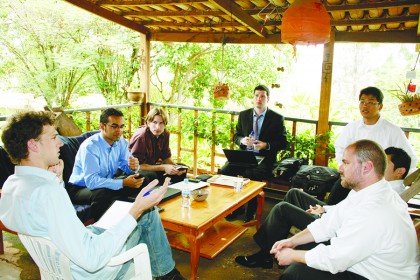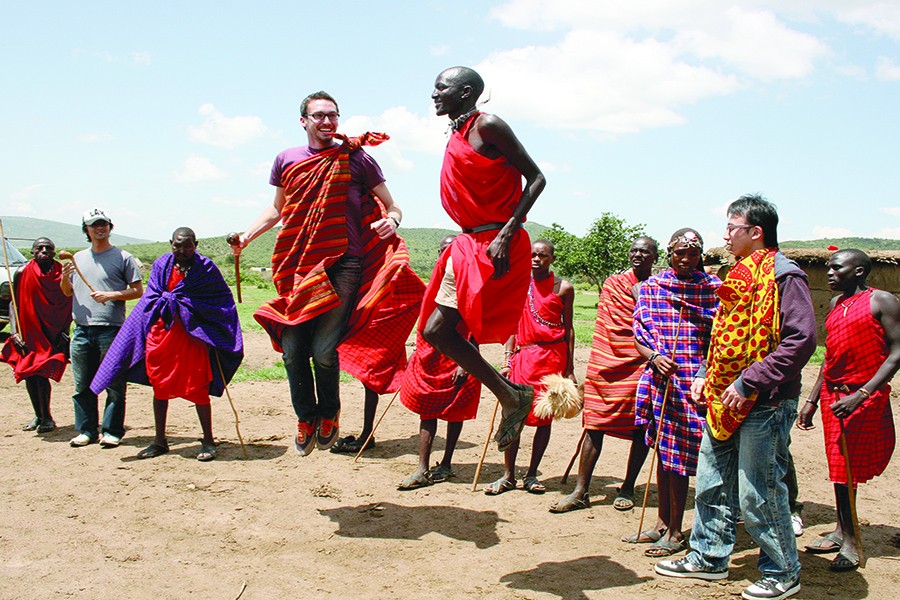The Peruvian Cancer Foundation has supported both patients and research in the South American nation since 1960. Its activities include operating a shelter that welcomes cancer patients from all regions of Peru, mostly children and teenagers who lack the financial means to deal with the disease. It also annually hosts a fundraising campaign to help thousands of patients with limited resources by buying medicine, medical supplies, transportation, and equipment for a medical facility in Lima.

Image caption: MBA students meet with Sam Dargan (left), the founder of Great Lakes Energy, at the renewable energy companys offices in Rwanda.
Image credit: COURTESY OF THE CAREY BUSINESS SCHOOL
To continue to help its constituents, however, the foundation needs more money—and has to maximize the funds it brings in.
Enter Johns Hopkins students with business acumen.
This winter, five Carey Business School Global MBA students worked with the Peruvian organization to develop some best-business practices, including a set of recommendations on how to invest a portion of the foundation's endowment and leverage funds that it receives from donors.
The project was one of four Carey student-run endeavors in Peru and part of the school's Innovation for Humanity Project, launched in 2010.
Since the program's founding, 248 Carey School MBA students have traveled the world to conduct 58 projects focused on health care, agriculture, water conservation, energy use, and other areas. A U.S. location was added after the program's first year to give international students an experience that would be foreign to them.
The required three-credit program for first-year students is designed to develop agile and creative business leaders who understand how to build sustainable and impactful businesses within developing communities.
During the 2012-13 winter intersession, students traveled to Peru, Ecuador, Rwanda, India, and Colorado to conduct 20 experiential learning projects with a humanitarian goal. Working in groups, they spent three weeks engaged with entrepreneurs, public officials, faculty, and staff from NGOs, exploring critical development issues.
By connecting with humanitarian and business leaders on site, the Innovation for Humanity Project seeks to provide students with an understanding of the complex systems that prevail in developing countries and identify community needs and challenges, according to Dipankar Chakravarti, a professor of marketing at the Carey Business School and faculty director for the Innovation for Humanity program.
Chakravarti says that, above all, students learn the value of resourcefulness.
"We wanted our students to experience economies, governmental structures, and environments that were quite different from what they were used to," he says. "They get to work on complex problems and learn the dynamics of doing business in a fragmented environment where the infrastructure may not be reliable."
In rural areas, for example, limitations might include unreliable Internet connections and a lack of basic medical equipment and treatment capacity at primary health care centers. In India, common environmental issues are weak regulation and enforcement of laws related to protecting the water table. In Peru, farming communities outside Lima lack capacity for community-level organization of farming and other entrepreneurial activities.
During the fall semester, the students prepare for their upcoming experience by researching relevant socioeconomic conditions, conducting industry analyses, critiquing case studies, hearing from experts, and presenting a country analysis to classmates. They also further define the projects, communicating via phone, email, and Skype with officials in the host country.
Once in country, the students hit the ground running.
Five project teams traveled to Rwanda this year. Despite its tragic history, Rwanda is emerging as one of the most-hopeful countries in sub-Saharan Africa. As Rwanda moves forward on fulfilling its mandates for Vision 2020, an ambitious development program, many reforms in government, business, education, and communications are opening numerous opportunities for entrepreneurs.
One team worked with Polyfam, a small private medical clinic in the nation's capital city of Kigali, which needed to optimize its resources to meet growing demand for health services. Carey students evaluated each of the clinic's departments to assess the utilization of current resources and staff so that the clinic runs as efficiently as possible. They recommended process improvements to increase effectiveness and efficiency across the clinic, and help aid its transition to a hospital.
Amanda Creel, one of the students working at Polyfam, says that the group was somewhat surprised to find that the clinic had an advanced software system for medical records, but quickly realized that the system was not being fully utilized. Making small changes to the system to enable clinic staff to easily use this beneficial resource became a priority for the Carey team. The group also noted the hectic and sometimes chaotic nature of the clinic. Patients were shuffled in and out quickly, she says, but sometimes had to wait hours for lab results. Without signs on doors, patients could walk into the wrong room and easily get confused navigating the clinic. The facility also had no clocks on the walls.
"We realized it's a different culture, but just the addition of signs and clocks could improve efficiency and streamline processes," says Creel.
Creel says the experience was both eye-opening and transformative.
"For me personally, the experience was huge. I hadn't traveled many places, especially not overseas," she says. "I've read about the people here in Rwanda and the history of the genocide, so I wasn't sure what to expect. But what we found was a lot of kindness and welcoming people who were eager to answer questions and help us help them."
Creel says that a highlight for her came on the last day.
The students had a day before given a presentation of their recommendations to some of the clinic's staff, who left right afterward to get back to work. "We didn't know how they felt about our presentation, but then I spoke with one of the staff members that evening, and they said they loved it. They asked us to come back on the day we were leaving.
"When we did, they had all these gifts and thanked us for what we had done. Up until then, we weren't sure what we were doing was helpful, so it was nice to hear and very rewarding. We later found out that they had already implemented some of our recommended changes."
Another Rwandan group partnered with Manumetal, a leader in the custom furniture industry that needed rebranding. Manumetal has made an impressive recovery after the genocide in 1994, when the organization lost most of its employees to the violence of the conflict. Since then, the company has risen to become a leading manufacturer of furniture in the country. However, international competition offering low-cost products has challenged its status, and it needed a new plan to address this competition and differentiate itself within the market.
The students helped Manumetal develop a marketing plan to adopt a strong corporate identity, with an emphasis on how to compete with Chinese firms. They also came up with recommendations on how a socially responsible effort can be incorporated into the marketing plan.
In India, a Carey group worked with LV Prasad Eye Institute, a comprehensive eye health facility with its main campus located in Hyderabad. A World Health Organization Collaborating Center for Prevention of Blindness, the institute offers comprehensive patient care, sight enhancement and rehabilitation services, and high-impact rural eye health programs. It also pursues cutting-edge research and offers human resources training for all levels of ophthalmic personnel.
The main objective of the project was to determine what strategies, processes, and innovations have led to the eye institute's growth over the last two decades and how the organization should use the knowledge gained during its success to develop a sound strategic plan for the next decade.
Among other student projects were ones dealing with water conservation, energy use, farming, and health care.
Chakravarti says that while organizations could get financial advice from local sources, the for-fee service would eat up their sometimes-limited funds.
There is a great synergy at work, Chakravarti says, between the students' skills and the needs of the host groups. "The organization benefits, and the students learn an enormous amount through the experience," he says. "These are relatively short engagements, but they can be very impactful. And the students can be transformed by the experience. They learn to work in teams, make some lasting friendships, and bond as a class."
And help their fellow man.
Posted in Politics+Society








